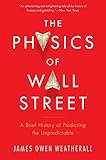http://www.amazon.com/The-Physics-Wall-Street-Unpredictable/...
Simons is mentioned but he refused to be interviewed for the book. However, it covers the history that leads up to the current day.
It's interesting that Simons' fund is pure algorithmic trading. No one decides that a position is too big, for example. Humans are out of the process after they write the algorithms.
> “a few funds that at any given moment outperform the indexes.” But over the years, he explains, their performances invariably decline..
There are a few hedge funds that, over decades, still beat the market. Medallion Fund, according to public knowledge, consistently generates above-market returns, never had a down year, and even returned 80% in 2008, when stock markets all over the world crashed. Its trading model is a highly guarded secret. It does not even let outsiders invest (with exceptions for a few).
The fund belongs to Renaissance Technologies, founded by a renowned Mathematical Physics professor, Jim Simons, and employs many PhDs in Physics and Math. (This book writes about it in fair detail. [2])
[1] How we can predict the next financial crisis: http://www.ted.com/talks/didier_sornette_how_we_can_predict_...
[2] The Physics of Wall Street: http://www.amazon.com/The-Physics-Wall-Street-Unpredictable/...


http://www.amazon.com/The-Physics-Wall-Street-Unpredictable/...
It doesn't cover the actual math. Not sure if there's a good book for that.